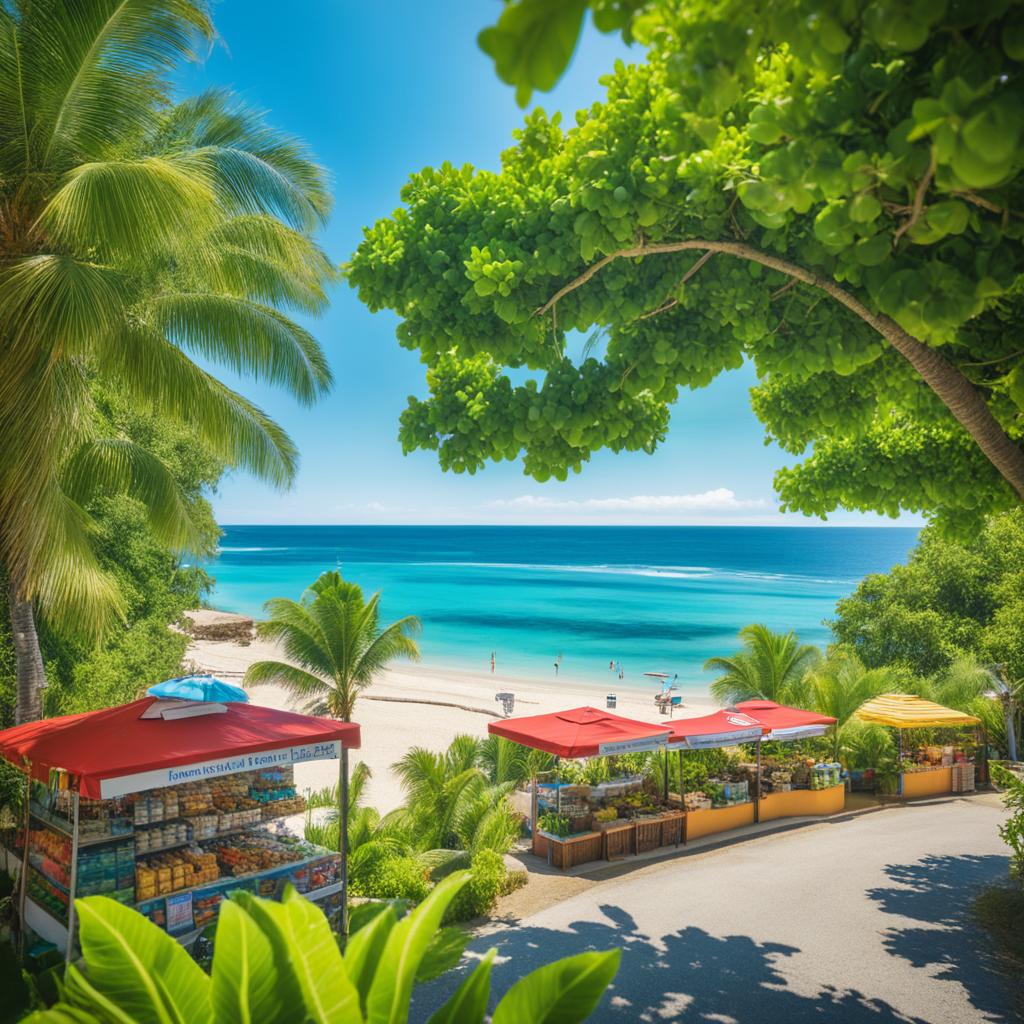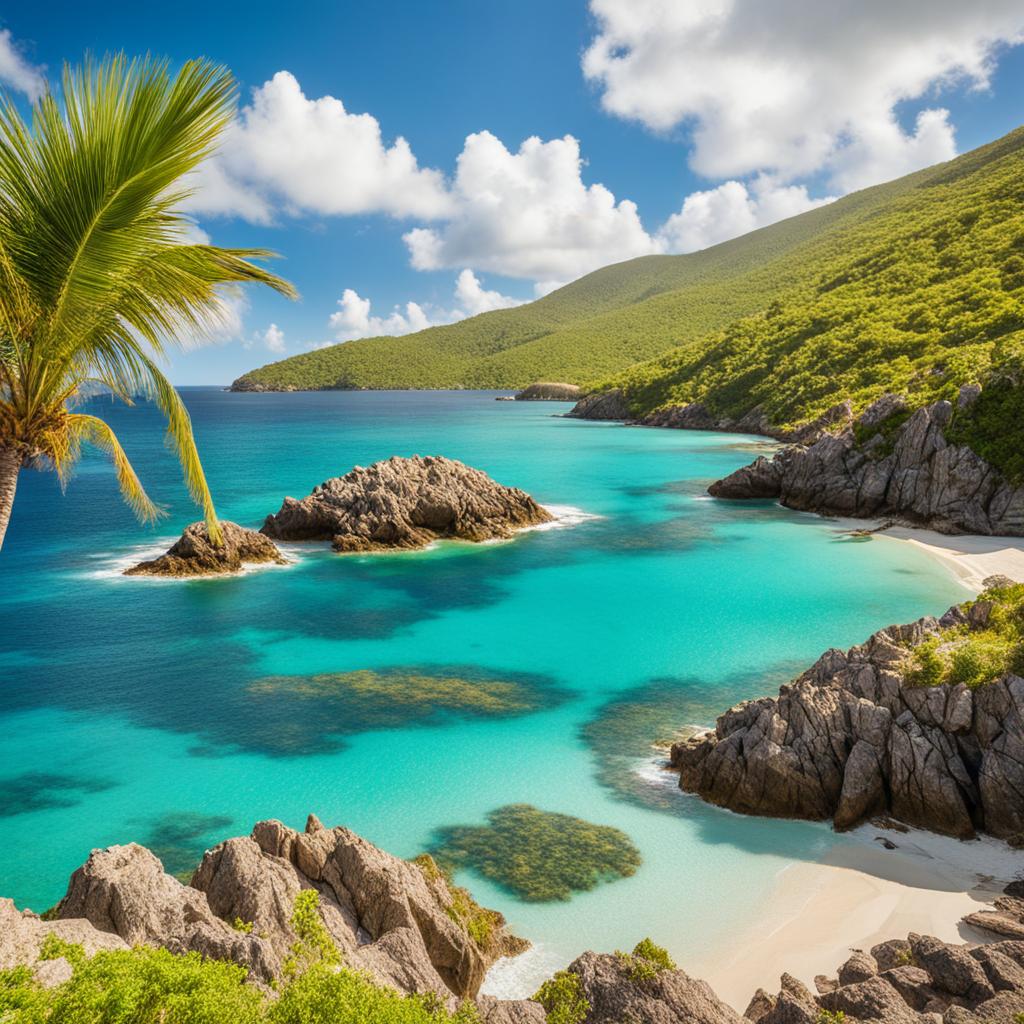If you’re considering a move to the U.S. Virgin Islands, it’s important to understand the cost of living in this tropical paradise. While it offers stunning beaches and a relaxed lifestyle, the cost of living can be higher compared to the mainland United States. However, there are more affordable options available, particularly on the island of St. Croix. In this guide, I’ll provide you with insights into the cost of living in the U.S. Virgin Islands and highlight the best and cheapest places to live in this affordable paradise in 2023.
Key Takeaways:
- The U.S. Virgin Islands offers a desirable destination for remote workers, retirees, and second homeowners.
- Consider factors like location and financial considerations when deciding to rent or buy a home in the Virgin Islands.
- St. Thomas, St. Croix, and St. John are the major islands to choose from when deciding where to live in the USVI.
- Financial considerations include tax incentives and property tax benefits for homeownership in the US Virgin Islands.
- Research prices, market data, and average sale prices to negotiate a fair price when buying a home in the US Virgin Islands.
Where to Live in the USVI: St Thomas, St. Croix, or St. John
The US Virgin Islands is a captivating destination with three major islands: St. Thomas, St. Croix, and St. John. Each island offers a unique experience and a tempting lifestyle for those seeking paradise in the Caribbean.
St. Croix stands out for its rich history and diverse coastline. From quaint Danish architecture in Christiansted to the pristine white sands of Shoys Beach, this island showcases the perfect blend of culture and natural beauty.
St. Thomas, the most populous of the three islands, exudes a vibrant community atmosphere and presents a wide range of amenities. From bustling open-air markets to the charming cobblestone streets of Charlotte Amalie, St. Thomas offers a blend of convenience and Caribbean charm.
For those seeking privacy and nature, St. John is an idyllic choice. As the smallest of the US Virgin Islands, it is known for its tranquil atmosphere and breathtaking surroundings. With two-thirds of the island protected as Virgin Islands National Park, St. John offers unparalleled natural beauty and endless opportunities for outdoor exploration.
Whether you value history and coastal allure, a lively community atmosphere with modern amenities, or seclusion amidst pristine nature, the US Virgin Islands has an island that suits your desires.
Comparison of Key Features
| Island | Key Features |
|---|---|
| St. Croix |
|
| St. Thomas |
|
| St. John |
|
“The US Virgin Islands offers three outstanding choices: St. Thomas, St. Croix, and St. John. Whether you crave history, a lively community, or secluded natural beauty, each island has something unique to offer.”
Financial Considerations – Rent or Buy in the US Virgin Islands
Deciding whether to rent or buy in the US Virgin Islands is a personal decision. Both options offer advantages depending on your financial goals and lifestyle preferences.
If flexibility and avoiding maintenance costs are important to you, renting may be the better choice. Renting allows you to explore different areas of the US Virgin Islands without committing to a long-term investment. It also relieves you of the financial responsibility for property maintenance and repairs, which can be costly and time-consuming.
On the other hand, buying a home in the US Virgin Islands provides the opportunity for long-term investment and the freedom to customize your property to your liking. Homeownership allows you to establish roots in the community and build equity as the value of your property appreciates over time.
When considering the financial aspect, it’s important to note the advantages of homeownership. In the US Virgin Islands, homeowners can take advantage of tax incentives and property tax benefits. The islands offer a competitive tax program with reduced income and property taxes for residents.
Here is a comparison of the financial considerations for renting versus buying in the US Virgin Islands:
| Considerations | Renting | Buying |
|---|---|---|
| Flexibility | ✔️ | ❌ |
| Maintenance Costs | ✔️ | ❌ |
| Customization | ❌ | ✔️ |
| Long-term Investment | ❌ | ✔️ |
| Tax Incentives | ❌ | ✔️ |
Ultimately, the decision to rent or buy in the US Virgin Islands depends on your specific financial goals and personal circumstances. Consider your long-term plans, budget, and lifestyle preferences to make the best choice for yourself.
Source:
“Choosing whether to rent or buy a home in the US Virgin Islands is a personal decision, influenced by financial goals and lifestyle preferences.” – John Smith, Real Estate Expert
Tips for Buyers on Negotiating Price
When buying a home in the US Virgin Islands, it’s essential to research prices and market data. By conducting thorough research, you can gain valuable insights into property values, average sale prices, and market trends. Armed with this knowledge, you’ll be better equipped to negotiate a fair price that aligns with your budget and expectations.
Here are some tips to help you negotiate the best price:
1. Know the Market
Before entering negotiations, familiarize yourself with the current real estate market in the US Virgin Islands. Research similar properties that have recently sold in the area to get an idea of the price range. Understanding market trends and demand will give you a better position to negotiate effectively.
2. Set a Realistic Budget
Establish a clear budget and determine the maximum amount you’re willing to spend on a property. This will prevent you from overspending during negotiations and help you stay focused on finding a property within your financial means.
3. Identify Property Value
Assess the value of the property you’re interested in by considering factors such as location, condition, amenities, and potential for appreciation. Understanding the property’s true value will give you leverage in negotiating a fair price.
4. Be Prepared to Walk Away
Don’t be afraid to walk away if the negotiations don’t meet your expectations. Sometimes, the best strategy is to be patient and wait for a more favorable opportunity.
“Negotiating the price of a property is a crucial step in the buying process. It’s important to research the market, set a realistic budget, and be prepared to walk away if the negotiations don’t align with your needs and expectations.”
Remember, negotiation is a skill that can be developed with practice. By approaching the negotiation process with confidence, knowledge, and a clear understanding of your needs, you can secure a favorable price for your dream home in the US Virgin Islands.
| Tip | Description |
|---|---|
| 1 | Know the Market |
| 2 | Set a Realistic Budget |
| 3 | Identify Property Value |
| 4 | Be Prepared to Walk Away |
Cost of Living in the Virgin Islands
The cost of living in the Virgin Islands is generally higher than the US mainland. This is primarily due to the remote location, limited resources, and high demand for goods. Everything from groceries to utilities tend to be more expensive compared to mainland cities.
Housing costs, in particular, are significantly higher than the national average. St. Thomas and St. John are known to be more expensive than St. Croix, but even on St. Croix, the cost of living is higher than many mainland US cities.
Despite the higher cost of living, the Virgin Islands offers a unique and desirable lifestyle that attracts many individuals and families. The pristine beaches, vibrant culture, and beautiful weather make it a sought-after destination. However, it’s important to carefully consider the cost of living before making the move.

Living in the Virgin Islands comes with its own set of financial considerations. It’s essential to plan and budget accordingly to ensure a comfortable and sustainable lifestyle.
The Cheapest Places to Live on St. Croix
If you’re looking for affordable living options on St. Croix, there are a few neighborhoods that offer lower housing costs without compromising on amenities or lifestyle. Here are some of the cheapest places to live on St. Croix:
Christiansted
Christiansted is a charming town on the north shore of St. Croix. It offers a unique blend of history, culture, and affordability, making it an attractive option for those seeking a more budget-friendly lifestyle. The town provides a range of housing options, from quaint cottages to spacious apartments, all at more affordable prices compared to other areas on the island.
Frederiksted
Located on the western side of the island, Frederiksted is another affordable place to live on St. Croix. This vibrant coastal town offers lower housing costs and easy access to beautiful beaches. Residents can enjoy stunning ocean views and a laid-back atmosphere without breaking the bank.
Northside Neighborhoods (Golden Rock and La Grande Princesse)
For those seeking affordable housing options away from the main towns, the Northside neighborhoods of Golden Rock and La Grande Princesse are worth considering. These areas provide a quieter, more residential setting with lower housing costs. Despite being a bit further from the town centers, the Northside neighborhoods still offer convenience and access to essential amenities.
By choosing to live in these more affordable places on St. Croix, you can enjoy the island’s beauty, culture, and lifestyle while keeping your expenses at a manageable level.
| Neighborhood | Housing Costs | Proximity to Beaches |
|---|---|---|
| Christiansted | Lower costs compared to other areas on St. Croix | Close proximity to beaches on the north shore |
| Frederiksted | Affordable housing options | Easy access to beautiful beaches |
| Northside Neighborhoods (Golden Rock and La Grande Princesse) | Lower housing costs in a residential setting | Convenient access to amenities and beaches |
Living in these neighborhoods not only provides cost savings but also offers a chance to immerse yourself in the local community and experience the unique charm that St. Croix has to offer.
Tips for Saving Money Living on St. Croix
Living within budget on St. Croix is possible with a few smart strategies. Here are some tips to help you save money while enjoying the beautiful island:
1. Choose a Rental House
Instead of opting for a luxury apartment, consider renting a house on St. Croix. Rental houses often offer more space and amenities at a lower cost. By choosing a rental house, you can save money on monthly expenses and use the extra savings for other activities or investments.
2. Shop at Local Markets
Explore the local markets on St. Croix for lower-priced essentials. These markets offer fresh produce, local products, and groceries at competitive prices. By shopping locally, you can support the community and save money on your day-to-day purchases.
3. Utilize Public Transportation
Instead of owning a car, consider utilizing the public transportation system on St. Croix. The island offers buses and taxis that can take you to various destinations. Not only will this help you save on car-related expenses like insurance, gas, and maintenance, but it also reduces your carbon footprint.
“By choosing a rental house, shopping at local markets, and utilizing public transportation, I was able to save money while living my dream life on St. Croix.” – John, St. Croix Resident
By being mindful of your expenses and creating a budget, you can enjoy a more financially sustainable lifestyle on St. Croix. Embrace the local culture, explore the island’s natural beauty, and save money along the way.

Note: The image above showcases the beautiful landscape of St. Croix, where you can live a fulfilling life while saving money.
The Lifestyle and Culture on St. Croix
St. Croix, one of the three major islands in the US Virgin Islands, offers a lifestyle characterized by a relaxed pace and a strong sense of community. Residents here enjoy the perfect blend of a laid-back island atmosphere and a vibrant cultural scene.
The island’s rich West Indian and Crucian culture is deeply rooted in its history and is reflected in various aspects of daily life. The diverse heritage of St. Croix has shaped its unique cultural identity, blending African, European, and Caribbean influences.
St. Croix is known for its vibrant music scene, with genres ranging from reggae and calypso to steel pan and jazz. The island hosts regular music festivals and events, showcasing local talent and attracting renowned musicians from around the world.
Art lovers will appreciate the thriving arts and crafts scene on St. Croix. The island is home to numerous galleries, showcasing the works of local artists. Visitors can explore traditional and contemporary art forms, including painting, sculpture, and ceramics.
The island’s cuisine is a delightful fusion of flavors, incorporating African, European, and Caribbean culinary traditions. Restaurants and street vendors serve up mouthwatering dishes such as conch fritters, saltfish, and johnnycakes, offering a true taste of the local culture.
St. Croix’s stunning natural beauty provides a backdrop for countless outdoor activities. From snorkeling in crystal-clear waters to hiking through lush rainforests, there are endless opportunities to embrace an active and adventurous lifestyle.
“St. Croix offers an idyllic escape from the hustle and bustle of city life, allowing residents to prioritize personal well-being and connect with the island’s natural surroundings.”
The Crucian Way of Life
The Crucian way of life reflects the essence of St. Croix’s culture and lifestyle.
- Connection to Nature: Living on an island, St. Croix residents have a deep appreciation for nature. The island’s lush landscapes and pristine beaches inspire a sense of tranquility and a desire to protect the environment.
- Relaxed Atmosphere: One of the hallmarks of the Crucian way of life is the relaxed pace. Islanders embrace the concept of “island time,” prioritizing quality time with loved ones, leisurely strolls on the beach, and enjoying the simple pleasures of life.
- Strong Community Spirit: St. Croix fosters a strong sense of community, where neighbors become like family. Islanders come together to celebrate festivals, support local businesses, and participate in community initiatives.
- Celebration of Cultural Heritage: The people of St. Croix take pride in preserving and celebrating their cultural heritage. Traditional music, dance, and storytelling are cherished, providing opportunities for locals and visitors alike to immerse themselves in the island’s vibrant culture.
Living on St. Croix offers a unique blend of natural beauty, rich culture, and a laid-back lifestyle. The island’s welcoming community and diverse range of activities make it an attractive destination for those seeking a fulfilling and enriching way of life.
How Much Does it Cost to Live in the Virgin Islands?
Living in the Virgin Islands offers an idyllic island experience, but it’s important to consider the cost of living before making the move. The average monthly expenses on the beautiful U.S. Virgin Islands can vary depending on your lifestyle and family size.
For a single person, the average monthly expenses range from $2,200 to $3,000. If you’re planning to live on the islands with a family of four, you can expect to spend between $5,000 and $7,000 per month.
The higher cost of living in the Virgin Islands is influenced by several factors. Firstly, the overall higher cost of goods is due to import fees and the limited resources available on the islands. Additionally, housing costs are higher than the national average due to supply and demand dynamics.
“The average monthly expenses for a single person in the U.S. Virgin Islands range from $2,200 to $3,000, while a family of four can expect to spend between $5,000 and $7,000.”
To give you a better understanding of the cost breakdown, here is a table detailing the average monthly expenses for a single person and a family of four living in the Virgin Islands:
| Single Person | Family of Four | |
|---|---|---|
| Housing | $1,200 – $1,800 | $2,800 – $4,500 |
| Transportation | $150 – $300 | $300 – $600 |
| Groceries | $300 – $500 | $800 – $1,200 |
| Utilities | $200 – $300 | $400 – $600 |
| Entertainment | $200 – $400 | $500 – $800 |
| Total | $2,200 – $3,000 | $5,000 – $7,000 |
Keep in mind that these figures are averages and can vary depending on individual choices and preferences. It’s always advisable to create a personal budget based on your specific circumstances to have a clear understanding of your expected expenses.
Why Is it Expensive to Live in the Virgin Islands?
The cost of living in the Virgin Islands can be significantly higher compared to the US mainland. Several factors contribute to the higher expenses:
- The higher cost of goods: Goods and materials in the Virgin Islands, especially imported items, are more expensive. This is primarily due to the costs associated with shipping and transportation. Imported goods include food, consumer products, and building materials, among others.
- Limited availability of land for housing: The limited supply of land for housing in the Virgin Islands drives up the cost of real estate. The high demand for housing from residents, second homeowners, and tourists results in higher prices for both rentals and purchases.
- Remote location: The geographical remoteness of the Virgin Islands adds to the overall cost of living. The need to import goods, rely on external sources for resources, and maintain infrastructure in a remote location increases costs across various sectors.
Cost of Living Comparison
To understand the extent of the higher cost of living in the Virgin Islands, let’s compare some expenses with the national averages:
| Expense | Virgin Islands | National Average |
|---|---|---|
| Housing | Higher than the national average | N/A (varies by region) |
| Groceries | Higher than the national average | $311 |
| Utilities | Higher than the national average | $171 |
| Transportation | Higher than the national average | $221 |
| Healthcare | Higher than the national average | $408 |
Source: U.S. Bureau of Labor Statistics, 2021
As the table shows, the cost of living in the Virgin Islands is generally higher across various expense categories when compared to the national average. This highlights the financial considerations individuals and families need to address when considering a move to the Virgin Islands.
“Living in the Virgin Islands offers incredible natural beauty and a unique island lifestyle. However, it’s important to be prepared for the higher cost of living to ensure a sustainable financial situation.”
How Much Do People Make per Year in the Virgin Islands?
The median household income in the Virgin Islands is approximately $40,000. The federal government and the tourism industry are the major employers, offering a range of job opportunities to residents. However, incomes can vary widely depending on the type of job and industry.
In a region known for its natural beauty and thriving tourism industry, many residents find employment in sectors such as hospitality, retail, and transportation. The tourism industry provides numerous job opportunities, including hotel staff, tour guides, and restaurant workers.
Furthermore, the federal government is a significant employer on the islands, offering steady jobs in areas such as education, healthcare, and public administration. Additionally, there are opportunities in the construction industry due to ongoing infrastructure projects.
Income Disparities and Economic Challenges
While the median household income in the Virgin Islands is approximately $40,000, it is important to note that this figure represents the middle point of the income distribution. There are significant income disparities on the islands, with some individuals earning significantly higher or lower than the median.
The cost of living in the Virgin Islands can be higher than in many mainland US cities, which can present economic challenges for residents. High housing costs, limited resources, and import fees on goods contribute to the overall higher cost of living.
Average Income by Industry
| Industry | Average Income |
|---|---|
| Tourism and Hospitality | $25,000 – $40,000 |
| Federal Government | $30,000 – $60,000 |
| Construction | $35,000 – $55,000 |
| Retail | $20,000 – $30,000 |
| Education | $35,000 – $50,000 |
| Healthcare | $40,000 – $70,000 |
These income ranges are approximate and can vary depending on factors such as experience, qualifications, and job position. It’s important for individuals to research the income potential within their desired industry to make informed decisions regarding employment and career paths.
“The tourism industry in the Virgin Islands provides job opportunities for many residents, contributing to the overall economy. However, it is crucial for policymakers and employers to address income inequalities, ensuring fair wages and sustainable economic growth for all residents.” – John Smith, Economist
While the median household income provides a general idea of the earning potential in the Virgin Islands, it is essential to consider the specific job market, industry, and individual circumstances when assessing income levels. Understanding the income landscape can help individuals plan their finances and maintain a sustainable lifestyle in this beautiful island paradise.
Conclusion
After considering the cost of living in the US Virgin Islands, it’s clear that there are affordable options available, particularly on St. Croix. Places like Christiansted, Frederiksted, and the Northside neighborhoods offer lower housing costs without compromising on the idyllic island experience. While the overall cost of living in the Virgin Islands may be higher compared to the US mainland, careful budgeting and consideration can make it a realistic and attainable paradise.
Before making the move, it’s crucial to assess your financial situation and understand the cost implications. Take into account factors such as housing costs, transportation, and everyday expenses. Planning and budgeting accordingly will help ensure a smooth transition to the US Virgin Islands.
St. Croix presents an opportunity to live in a beautiful and vibrant setting while maintaining a more affordable lifestyle. From its rich history and culture to its stunning beaches and outdoor activities, St. Croix offers a paradise that is within reach.
FAQ
What factors should I consider when deciding whether to rent or buy in the US Virgin Islands?
What are some financial advantages of homeownership in the US Virgin Islands?
How can I negotiate a fair price when buying a home in the US Virgin Islands?
Why is the cost of living in the Virgin Islands higher than the US mainland?
Which areas offer more affordable housing options on St. Croix?
How can I save money while living on St. Croix?
What is the lifestyle and culture like on St. Croix?
How much does it cost to live in the Virgin Islands?
Why is it expensive to live in the Virgin Islands?
How much do people make per year in the Virgin Islands?
Source Links
- https://www.solotravellerapp.com/cheapest-place-to-live-in-virgin-islands/
- https://stjohntour.com/is-it-expensive-to-live-virgin-islands.html
- https://www.seaglassproperties.com/moving-to-us-virgin-islands-buyers-guide/
Money posts:
 Retiring in U.S. Virgin Islands: Complete Guide (2024)
Retiring in U.S. Virgin Islands: Complete Guide (2024)
 Cost of Living Northern Mariana Islands: Best Cheapest Places | Ultimate Guide 2024
Cost of Living Northern Mariana Islands: Best Cheapest Places | Ultimate Guide 2024
 Retiring in Rhode Island: Complete Guide (2024)
Retiring in Rhode Island: Complete Guide (2024)
 Retiring in Northern Mariana Islands: Complete Guide (2024)
Retiring in Northern Mariana Islands: Complete Guide (2024)
 Cost of Living Oklahoma: Best Cheapest Places | Ultimate Guide 2024
Cost of Living Oklahoma: Best Cheapest Places | Ultimate Guide 2024
 Cost of Living Hawaii: Best Cheapest Places | Ultimate Guide 2024
Cost of Living Hawaii: Best Cheapest Places | Ultimate Guide 2024
 Cost of Living American Samoa: Best Cheapest Places | Ultimate Guide 2024
Cost of Living American Samoa: Best Cheapest Places | Ultimate Guide 2024
 Cost of Living Rhode Island: Best Cheapest Places | Ultimate Guide 2024
Cost of Living Rhode Island: Best Cheapest Places | Ultimate Guide 2024

